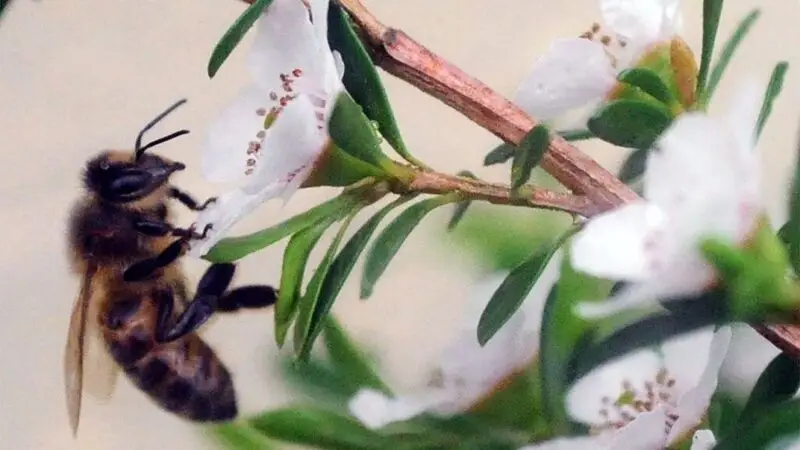
- About 80% of all breast cancer diagnoses are ER-positive.
- Although there are traditional treatments available for ER-positive breast cancer, some people also elect to follow complementary and alternative treatments as well.
- Researchers from the University of California, Los Angeles say that Manuka honey is a potential alternative prevention and treatment option for breast cancer, particularly ER-positive breast cancer, via animal and cancer cell models.
As of 2022, about 2.3 million women around the world received a breast cancer diagnosis, making it the 2nd most common cancer in the world.
About 80% of all breast cancer diagnoses are estrogen receptor-positive (ER-positive). This means that the breast cancer cells contain receptors that bind to the hormone estrogen and may require estrogen to grow.
Current treatment options available for ER-positive breast cancer include
Past studies have also examined
Now researchers from the University of California, Los Angeles say that Manuka honey could also potentially be used as an alternative prevention and treatment option for breast cancer, particularly ER-positive breast cancer, via animal and cancer cell models.
The study was recently published in the journal Nutrients.
Manuka honey is made by bees who collect the nectar of the Manuka tree, which is indigenous to Australia and New Zealand.
For this study, researchers used both mouse and breast cancer cell models to find out how Manuka honey might impact breast cancer.
“Manuka honey has a number of unique nutrients and bioactive compounds that likely contribute to its health benefits as a ‘
“As we referenced in the published manuscript, there were a number of traditional, anecdotal, and preclinical reports on anti-tumor effects of Manuka honey, which was also described as possessing
During their research, Pietras and his team found that Manuka honey caused an 84% tumor growth reduction in mice with ER-positive breast cancer cells without negatively impacting healthy breast cells or causing major side effects.
“In one of the most challenging experiments that we performed, administration of Manuka honey alone significantly inhibited the growth of established human ER-positive breast tumors in a preclinical in vivo treatment model by 84%, resulting in an observable reduction in tumor volume,” Pietras said.
“Although promising, our findings highlight the need for further research into the use of natural compounds, such as Manuka honey, for anti-tumor efficacy and potential chemoprevention and investigation of molecular pathways underlying these actions.”
— Richard Pietras, MD, PhD
Scientists discovered that higher amounts of Manuka honey was correlated with a greater reduction in cancer cell growth.
“Dose escalation studies are common in drug development studies in order to find the
Additionally, researchers found that using Manuka honey helped reduce levels of
“The progression of breast cancers is mediated by multiple, complex pathways,” Pietras explained. “In the case of ER-positive breast cancers, estrogens that bind to and activate estrogen receptors (ER) are a primary driver of uncontrolled tumor growth. Consequent binding of ERs to specific sites in DNA leads to the start of a program of gene transcription that modulates numerous downstream functions to support cancer progression.”
“Mechanisms of antitumor action of Manuka honey and its constituent compounds are suggested to include activity as
In this study, Pietras said, he and his team investigated the potential antitumor effects of Manuka honey on estrogen receptor positive and negative breast cancer.
“We further elucidated possible signaling pathways involved in the mechanism of action of Manuka honey,” he continued. “Activation of critical intracellular signaling pathways such as AMPK and inhibition of downstream mTOR signaling — a ubiquitous kinase enzyme that regulates cell growth, proliferation, metabolism to support tumor growth — as well as STAT3 that plays an important role in regulating cell death, angiogenesis, metastasis, and immune responses also appear to be molecular targets that are mediating antitumor therapeutic action of Manuka honey.”
After reviewing this study, Bhavana Pathak, MD, a board certified hematologist and medical oncologist at MemorialCare Cancer Institute at Orange Coast and Saddleback Medical Centers in Orange County, CA, told MNT she found the study very interesting and promising.
“I am worried about the effect of ingesting a compound which can theoretically increase glucose, which traditionally is less recommended in cancer. However, its overall impact is what should be considered,” Pathak continued.
“One size all treatments no longer are as acceptable, first based on patient biology and also based on patient preference,” she added. “With minimal side effects, this could be an alternative for those seeking natural supplement or opting out of treatment completely. Next steps are testing in humans and determining safe dosing and treatment effect.”
MNT also spoke with Monique Richard, MS, RDN, LDN, FAND, RYT-200, a registered dietitian nutritionist and owner of Nutrition-In-Sight, about this study.
“Despite the many accolades and beneficial properties attributed to the compounds unique to Manuka honey, the study results on tumor growth inhibition did surprise me,” Richard said. “It is important to note the study was on mice, however, the findings certainly encourage further research to be conducted to see if the results can be replicated.”
“It may be possible that Manuka honey’s long list of ‘anti-‘ benefits — antibacterial, antimicrobial, antioxidant, and anti-inflammatory — could grow longer with ‘antitumor,’ ‘antiproliferative,’ and ‘antimetastatic’ effects possibly being added. This powerful gooey liquid native to bees from New Zealand that pollinate the Manuka bush is Mother Nature’s gold and has the potential to assist in conventional breast cancer treatment minus the harsh toxic side effects.”
— Monique Richard, MS, RDN, LDN, FAND, RYT-200
For readers wishing to incorporate more Manuka honey into their diet for its many ‘anti-‘ benefits, Richard urged following a “less is more” approach:
- try it in a cup of green or black tea
- add to hot oatmeal or overnight oats
- mix with nut butters or yogurt
- drizzle on fruit, whole grain toast, or popcorn
- add to smoothies, roasted vegetables (think carrots, turnips, or sweet potatoes), or granola
- use in a salad dressing, marinade, or glaze
“No need to go as wild as Winne-the-Pooh would with a jar of Manuka honey as it is high in carbohydrates since it is primarily glucose-aka sugar, but a teaspoon or drizzle can add a special touch while providing potential health benefits. Some great options to enhance flavor and take advantage of this natural treasure are abundant. Keep in mind that quality, source, and authenticity are paramount to reaping the benefits of this particular honey,” she said.





